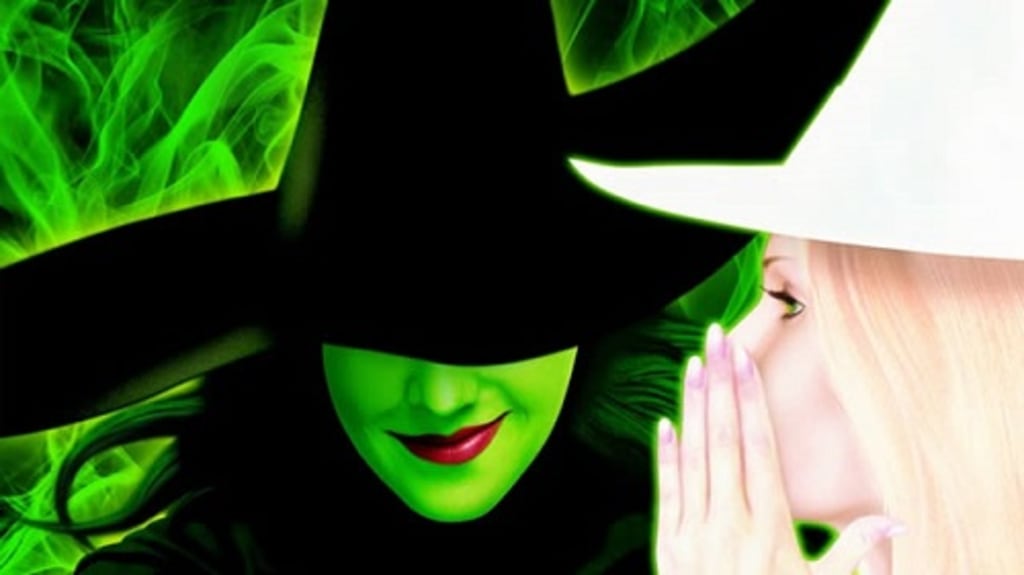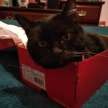A Wicked Reiew by Victoria Ward: The Novel and Musical
Review

** Wicked: The Life and Times of the Wicked Witch of the West
by Gregory Maguire . Review written by Victoria Ward
** If you are under 18, I would advise you not to read the book until you are over 18! The actions in this book are not meant for children! The musical is a lot cleaner and more entertaining.
Intro:
Which came first, the novel or musical? The correct answer is the 1995 novel written by Gregory Maguire and illustrated by Douglas Smith.
According to Google, the musical came after the novel in June of 2003.
NBC News posted an article claiming that “A film adaptation of the 2003 Broadway musical "Wicked" is in the works at Universal Pictures. It stars Ariana Grande and Cynthia Erivo” (NBC News).
Each of these mediums has their merit, and I would like to focus on the book and the musical.
The Book:
In the book, the story of Wicked is about two girls and their rises to fame in the land of Oz. One of the girls is Elphaba, born with green skin and a temper. The audience meets Elphaba as a baby and watches her grow up by the attendance of her mother and nanny. We see that Elphaba is a wild child with her deep green skin, sharp teeth, and unsettling mannerisms. “She looked, thought Melena, like a sphinx, like a stone beast… Then suddenly, she leaped and pounced, a naked green kitten after an invisible butterfly” (Maguire 46). There is an animal-like quality of Elphaba during her earlier years due to the lack of discipline she receives. Elphaba has a solitary life living in the small house with her mother and nanny. She had no formal schooling except what her father taught her as a priest, so her mindset from a young age was limited.
The culture of her own home is messy with her father being a priest with firm beliefs against Tiktokism.“or even tiktokism, which hardly even qualifies as a religion. To the ignorant, everything is spectacle these days. The ancient unionist monks and maunts (nuns) knew their place in the universe--acknowledging the life source too sublime to be named” (Maguire 41). A Dragon clock is making the rounds around the Munchkinlands to share the beautiful prophecies that the wizard sends of good times to come if they listen to him. Frex, Elphaba’s father, according to his exclamation from above, believes that worshiping an Unnamed god, maybe the wizard, with abandon is not a religion, but a cult following. This knowledge carries her resentment of the wizard along her disgust of what he is doing to the poor Animals of Oz.
She grows up with the stories, knowledge, and ideas from her father of an Unnamed god, who later she rejects. She also takes part in her own love affair with the married Arjinki or Vinkus prince, Fiyero. Elphaba must also combat with people taunting her or running away in fear of her green skin as something different. These are the lessons and circumstances of Elphaba’s life that set her up for her own tragedies. Elphaba’s mother takes part in an illustrious affair with a traveler who stays at their house. Elphaba doesn’t understand the tragedy of what people in her house are doing and saying around her, but it is normal for her to be around such wickedness. This is something her nanny says to her mother: “Of course there is cruelty. But Elphaba must learn who she is and must face down cruelty early. And there will be less of it than expected” (Maguire 48). I like Nanny’s optimism for Elphaba’s future, she would be shocked how much cruelty is handed to her charge.
The other girl in the story is Galinda born into an important family of the Arduennas Clan on her mother's side. She is a gorgeous girl who is loved and praised by all. Galinda is a smart young woman but tends to not put in the effort on her schoolwork or others, mostly on herself until she meets Elphaba. Both of the girls grew up with very different backgrounds, but they cross paths when they went to Shiz University. Their relationship starts as a complete loathing of one another with their contrasting opinions on life, religion, and politics. However, their attitudes change when Galinda helps Elphaba to see she is as beautiful on the outside as she is on the inside. They became friends, and they learned to tolerate each other's opinions even if they don’t agree with one another.
Elphaba and Galinda experience the horror of a new teacher, Dr. Nikidik, as a replacement for their Animal teacher, Dr. Dillamond, torture a poor creature to scare from learning how to speak. This event causes a path for Elphaba that leads to her becoming the Wicked Witch of the West. I understand her anger; if someone was intentionally harming an animal, I would be furious too. I don’t have the powers that Elphaba has, but I would step in to save the creature like she did.
After Shiz University, Elphaba goes to the Emerald City to meet the wizard and discovers that he is trying to take over Oz by silencing the Animals that have learned how to speak. The wizard believes that they evolved too far to be allowed to live freely anymore. In the book, the creatures who had learned to use words to communicate were represented with capitalizing the word they were being referenced as. For example, I capitalized Animals in the last sentence to note they were versed in human language, and other animals’ that didn’t know how to talk were left uncapitalized. The comparison I have to what a world with talking Animals who are cut off from society simply based on what they are is Zootopia. In Zootopia, the predators were shunned away and looked down upon like Elphaba and her green skin.
Along with silencing the Animals and Oz, thus the need to reign in the Animals and those of different races. He is also taking over different parts of Oz to create the yellow brick road; some are furious about it. The wizard makes unjust rules to stop any form of rebellion against him, which he fears since he created his political position without being elected.
Elphaba was raised in Munchkinland territory, but the traveler that came to stay with her family was a Quadling. He told them what was happening in the Ruby mines in their country. “Rubies under the water. Red as pigeon blood. Engineers to say: Red corundum in bands of crystalline limestone under swamp. Quadling to say: The blood of Oz'' (Maguire 56). This quotation provides that the wizard and his engineers were taking resources from places like Quadling country to pursue their own expansion of Oz without considering the people who lived there.
The rubies in the mines can also be speculated to be the same rubies that the Wicked Witch of the East, Elphaba’s sister, Nessarose, is wearing when Dorothy’s house falls on her. When the girl from the twister meets Glinda, the good witch decides to give the ruby slippers to Dorothy. Elphaba is angered by Glinda for passing on the shoes to a girl who she believes doesn’t deserve them or know the desire to own the shoes herself. There is also a political reason for keeping the shoes in Munchkinland. “Glinda, if those shoes fall into the hands of the Wizard, he’ll use them somehow in a maneuver to reannex Munchkinland. By now they have too much significance to the Munchkinlanders” (Maguire 348). The shoes play a deeper role in this version of the Oz story. I like connecting the dots between Elphaba and Dorothy’s story.
From the part of the book about Emerald City to the end is vastly different from the musical. Something happens that changes Elphaba’s life forever. She goes to a convent where she goes through therapy, helps others with illnesses, and tries to put away every wrong or wicked thing she has done in the past. Elphaba stays in the Emerald City until he takes a long trip into the other lands of Oz. She meets characters that are not mentioned in the musical, learns about herself as the Wicked Witch of the West, and ultimately loses all she has. It is a seemingly dreary ending, don’t you think? Fortunately, for those in the musical community, a wonderfully romantic tale was created about a young witch who would do anything for what she stood for, who she loved, and get away in the end.
Book vs. Musical:
Characters:
The official Wicked the Musical website explains the musical’s plot as this: “Wicked looks at what happened in the land of Oz- But from a different angle. There is a young woman, born with emerald-green skin_smart, fiery, misunderstood, and possessing an extraordinary talent. When she meets a bubbly blonde who is exceptionally popular…” (Wicked website). This quotation is true, it’s the basic setup like the book, but a lot was changed in order to allow the Story of Wicked to be performed on stage.
In the musical, the character of Elphaba is praised when she enters the stage as a young adult in opposition to the first third of the book about her early childhood. She is also quite adamant about going to work with the wizard as an apprentice. She is naive to what the wizard is really doing in Oz and so is the audience. I didn’t realize what was happening until the climactic scene. She meets the wizard during her time at Shiz University and when she is older as the Wicked Witch. In the book, her hatred for the wizard grows over time and from afar.
Galinda or Glinda’s character is a lot more entertaining to watch in the musical. Her bubbly-blonde personality provides the more comedic side of the character that her character in the book isn’t as strong. The relationship between Elphaba and Glinda are mostly the same in the book and the musical, but the major difference is that in the musical the two appear as friends throughout the entire production. In the book, they grow apart when Elphaba leaves her to go to the Emerald City alone instead of together.
As far as characters go, Fiyero’s backstory is the most changed from the novel to the stage. In the book, Fiyero Prince of the Vinkus, married, and has three children. The musical basically removes all of this backstory leaving a carefree prince of the Vinkus who prefers dancing through life instead of staying on the straight path. In translating Fiyero’s character to the stage, his markings that indicate where he’s from, were removed because the small detail couldn’t be seen. The last major difference between the book and musical is that Fiyero is engaged to Glinda, and what happens to Fiyero in the endings. I can’t in good conscience tell you what happens; I’ll let you figure it out.
In the book, Boq is one of Elphaba’s friends who has a crush on Glinda, and he helps Elphaba with research for Dr. Dillamond’s sake. Later on in life, he loses the crush for Glinda, marries another girl, and starts a farm out in the countryside. In the musical, Boq has a large crush on Glinda, and Nessarose, Elphaba’s sister, has a major crush on Boq. A series of unfortunate events leads to a transformation in Boq; I won't spoil anymore.
In the book and musical, Dr. Dillamond, a goat who teaches classes, and I don’t mean greatest of all time, but a real goat, is taken away from Shiz University. His removal is because of the Animal Mobility Act: “the Wizard of Oz has proclaimed Banns on Animal Mobility…This meant not only that Animals were restricted with their access to travel conveyances, lodgings, and public services. The Mobility it referred to was also professional” (Maguire 88). This Is the same type of racism that took place back in the Civil War. Elphaba decides to continue Dr. Dillamond’s research on Animals and the Wizard. Galinda changes her name to simply Glinda in solidarity with Dr. Dillamond because he insisted on calling her that in his classes.
In the book Nessarose is born with arms while in the musical she is born without legs. It is much easier to show legs that don’t work than someone who doesn’t have arms. In both mediums she becomes the Imminent Thropp, ruler of Munchkinland, but her actions in the role differ. In the book, Nessarose is distant with Elphaba, their father, and her people. However, in the musical, she falls in love with Boq and marries her.
Madame Morrible or should I say Madame Horrible is a woman who only cares about herself and her standing in society. She is the head administrator at Shiz University, but she has her own political secrets. She is the same in the book and musical, wicked. The Wizard of Oz in the book takes a back seat to the story of Elphaba but eventually comes out to play his cards later in the book. The musical version of the wizard is more magical, playful, and attractive as a good character.
These have been the main character differences between the book and musical versions of themselves. I find that a lot of changes were made for these characters in order to make the musical more appropriate for wider audiences, to gain more popularity, and to be contained in a two-and-a-half-hour show. Both are great works of art for what they are, wickedly good!
General vibes:
I must say that I did enjoy reading the book despite the controversial topics, and the musical was amazing because of the changes that were made from page to stage. The book made me a little queasy in some more adult scenes while the musical left me in awe of the magic created from the newly invented story of the Wicked Witch of the West. The musical talent of the cast also made my jaw drop with tears of joy running down my face. It was one of the best Broadway musicals I had ever seen considering it was my first.
Sexiness:
** If you are under 18, I would advise you not to read the book until you are over 18! The actions in this book are not meant for children! The musical is a lot cleaner and more entertaining.
In the book, the Emerald City is a representation of Elphaba and her sin with Fiyero. Both Elphaba and the city are green like sin, envy, and greed. These two lovers don’t care who they are, who they belong to, or where they are in the world as long as they have each other. The love they felt for each other after saving the creature at Shiz only grew bigger because Fiyero understood why Elphaba was the way she was.
Expansion on the land of OZ:
The musical mostly takes place at Shiz University in Gilikin and the Emerald City while the book dives deeper into the surrounding lands of Oz. The book holds a lot of history and background of Oz that the musical cannot delve into. However, before the musical starts there is a map of Oz that the audience can look at. The book also has the map to help understand where each land is and the resources they hold.
The musical gives only a snapshot of the life each character lives. It does a great job of picking out the moments that are important to the story, delivering well-written songs of love, joy, pain, and fear, and giving a new twist to the story of Elphaba as The Wicked Witch. The book is much more detailed in the creation of the Land of Oz from a new perspective than L. Frank Baum did in the original Wizard of Oz.
Exeunt (Exit):
This has been a look into the Wicked novel by Gregory Maguire and the musical reinvented by Winnie Holzman. There is more to be learned about the messages in Wicked, so I have decided to write a part two to this review. The second part will explore what wickedness really is, where it comes from, and why we feel the need as human beings to explore our wicked sides
There are also many other views on the story of the Wicked Witch of the West and other versions of Oz stories. I am glad to have read and watched over the years. Now, it is time to move onto the next adventure until we meet again in part two!
“And of the Witch? In the life of a Witch, there is no after, in the ever after of a Witch, there is no happily; in the story of a Witch, there is no afterward” (Maguire 406).
Work Cited:
Kubota, Samantha. ‘Wicked’ film adaptation casts its Elphaba and Glinda. Today News. February 23rd, 2022. Ariana Grande and Cynthia Erivo to star in 'Wicked' film adaptation (nbcnews.com).
Maguire, Gregory. Wicked: The Life and Times of the Wicked Witch of the West. HarperCollins Publishing. 1995.
So Much Happened before Dorothy Dropped In. 2021 Wicked LLC. February 23rd, 2022. https://wickedthemusical.com/the-show/.
About the Creator
Victoria Ward
I am a girl who likes reading, writing, watching, and having fun! I love writing about books, movies, music, games, and anything else that makes me happy.
Come down the rabbit hole with me!






Comments
There are no comments for this story
Be the first to respond and start the conversation.